





CHANCELLOR’S LEADERSHIP DEVELOPMENT PROGRAM









CHANCELLOR’S LEADERSHIP DEVELOPMENT PROGRAM


FromallofusattheChancellor’sLeadershipDevelopmentProgramandtheShelton LeadershipCenter,pleaseacceptourheartfeltwelcomeasyoubeginthisexciting journey.Wearegenuinelythrilledtohaveyoujointhiscommunityofvalues-based leaders.
TheChancellor'sLeadershipDevelopmentProgram(CLDP)isaspecialplacewhereyou willdiscoverandnurtureyouruniqueleadershippotential.Webelievethatleadershipis notjustaboutskillsandknowledge,butalsoaboutthevaluesweholddear.That'swhy thisprogramisbuiltuponthefoundationoftheSheltonLeadershipCenter'scorevalues:
Integrity:Webelieveinleadingwithhonesty,transparency,andunwaveringethical principles,evenwhenfacedwithchallenges.
Diversity:Wecelebratethebeautifultapestryofhumanexperiencesandstriveto createaspacewhereeveryonefeelssafe,respected,andempoweredtosharetheir uniqueperspectives.
Compassion:Weunderstandtheimportanceofempathyandkindnessinleadership, andweencourageyoutoleadwithyourheartaswellasyourmind.
SocialResponsibility:Webelievethattrueleadershipinvolvesadeepcommitment toservingothersandworkingtowardsamorejustandequitableworldforall.
Thesevalueswillguideyouthroughoutthisprogram,inspiringyoutobecomealeader whonotonlyachievesgreatthings,butalsoupliftsandempowersthosearoundyou.
Asyouembarkonthistransformativejourney,weencourageyoutoopenyourheartand mindtonewexperiences,embracechallengeswithcourageandresilience,andconnect withyourfellowleadersinaspiritofcollaborationandsupport.Weareheretowalk alongsideyoueverystepoftheway,cheeringyouonasyougrowanddiscoverthe incredibleleaderwithinyou.
Wecannotwaittowitnessthepositiveimpactyouwillmakeontheworld.Welcometo theShelton-CLDPCommunity!
Withwarmestregards,
La’ToyaCesar Director,Chancellor'sLeadershipDevelopmentProgram

Email: Ldreed@ncsu.edu | Phone: 919.513.3434
LinkedIn: www.linkedin.com/in/latoyacesar

Email: sstaffo@ncsu.edu | Phone: 919.513.0148

The Shelton Leadership Center was founded in 2002 by General Hugh Shelton following his retirement as Chairman of the Joint Chiefs of Staff. His desire to give back to his alma mater, North Carolina State University, prompted him to initiate a scholarship. Soon, his efforts grew to include educational programs, youth summer programs, and organizational development training focused on developing the next generation of valuesbased leaders.
The Shelton Leadership Center’s values-based leadership development programs now reach youth, college students, and professionals at NC State University and other higher education institutions, corporations, government entities, nonprofits, and youth development organizations. His values-based leadership approach is based on four values: integrity, diversity, compassion, and social responsibility.
Vision
The Shelton Leadership Center’s vision is to be a leading community of practice in values-based leadership development throughout pre-college, university, and professional communities, and eventually across the nation and world through access. Our Center will sustain and expand handson interdisciplinary training and skills development that emphasizes personal values, preparing future generational leaders for tomorrow’s greatest challenges.
Mission
To inspire, educate, and develop values-based leaders committed to personal integrity, professional ethics, and selfless service.
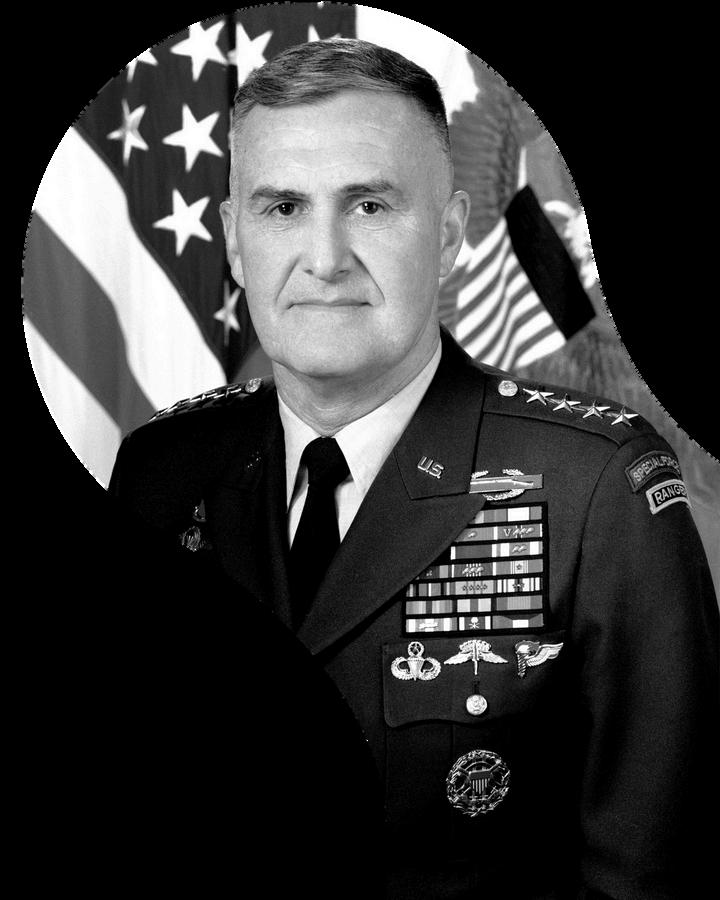
The Shelton Leadership Center is home to the Chancellor’s Leadership Development Program (CLDP), which launched in 2017 in partnership with the NC State University Office of the Chancellor. The program facilitates transformational leadership experiences for first-generation college students and/or students from rural counties in North Carolina. Through transformative experiences such as impactful service, workshops, mentorship, and experiential learning, CLDP cultivates values-based leaders. Students develop critical skills in communication, problem-solving, and teamwork, while deepening their understanding of ethical decision-making and social responsibility. CLDP equips emerging leaders with the tools to make a lasting impact in their communities and careers. Additionally the CLDP engages students as leaders in professional and personal capacities, empowering them to apply the skills they’ve learned in the program to leadership experiences across campus, within their communities, and in global settings.
CLDP develops rural and first-generation leaders who are committed to strengthening the social and economic well-being of all North Carolina communities.
To create a community of value-based leaders, committed to serving, inspiring, and empowering others to make positive change.
CLDP focuses on strengths not weaknesses. While many programs have a deficit model approach to addressing barriers typically faced by first generation and rural students, CLDP focuses on a more strengths based approach. In fostering a strengths based approach, we develop and empower values-based leaders who embrace their own lived experiences, cultures and beliefs.
CLDP is a community that provides a safe space for students to develop and grow their leadership skills without the fear of judgment, ridicule or embarrassment. Additionally, the supportive environment of workshops fosters a sense of community and belonging, encouraging participants to step outside their comfort zones and try new things.
CLDP connects students with a network of peers and mentors that provide ongoing support from first year through graduation and beyond. Additionally, students are provided with opportunities to connect and engage with University and business leaders.
CLDP is a two-year program, with an optional third year. Each year in the program is designed to build off the lessons and skills explored in the previous year. From their start in the program, students explore leadership on a personal level and advance to applying what they've learned to leading others by year two. By the third year, students take on leadership roles within the CLDP and experience leadership in global environments. This is achieved through student-led programming and opportunities to serve on the SLC Executive board of advisors. Year 3 of the program equips students with advanced leadership strategies and organizational management skills. Through real-world application students gain practical experience in leading teams, managing change, and making strategic decisions. Graduates of this program emerge as well-rounded leaders prepared to drive innovation and positive impact within their organizations and communities.This scaffolding approach to leadership development is further explained in the CLDP Curriculum.
Students in the program may have access to the following:
Professional and leadership development resources, training, and events.
A network for professional, academic, and personal support through individualized mentoring sessions with SLC staff and external mentors directly aligned with students’ career industries and programs of study.
Engage with senior leadership at NC State and leadership throughout the Triangle. Domestic service trips
International experiences to explore leadership in a global context
Scholarships for First Year and Returning Students (dependent on funding availability).
Upon acceptance into the CLDP, the Participant may be entitled to receive the following benefits:
$1,000 Chancellor's Leadership Development Program 2024/2025 (Dependant on Funding)
1:1 Peer mentoring and Coaching from CLDP staff
Monthly leadership development programming
CLDP exclusive events with the NCSU Chancellor
Social and service programs with other CLDP peers
Domestic Service Trip (Year 2)
Global Learning Experience (Year 3).
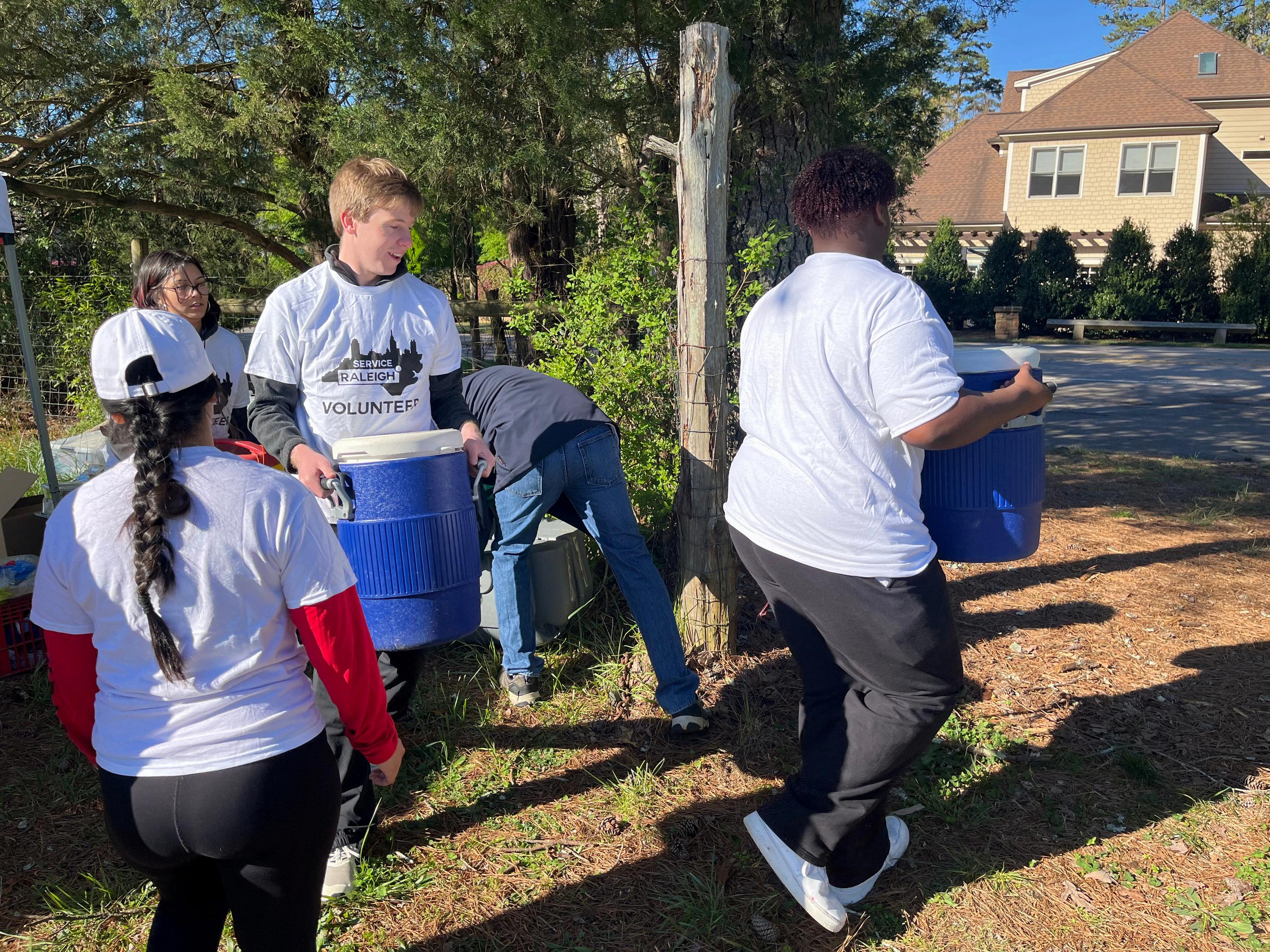
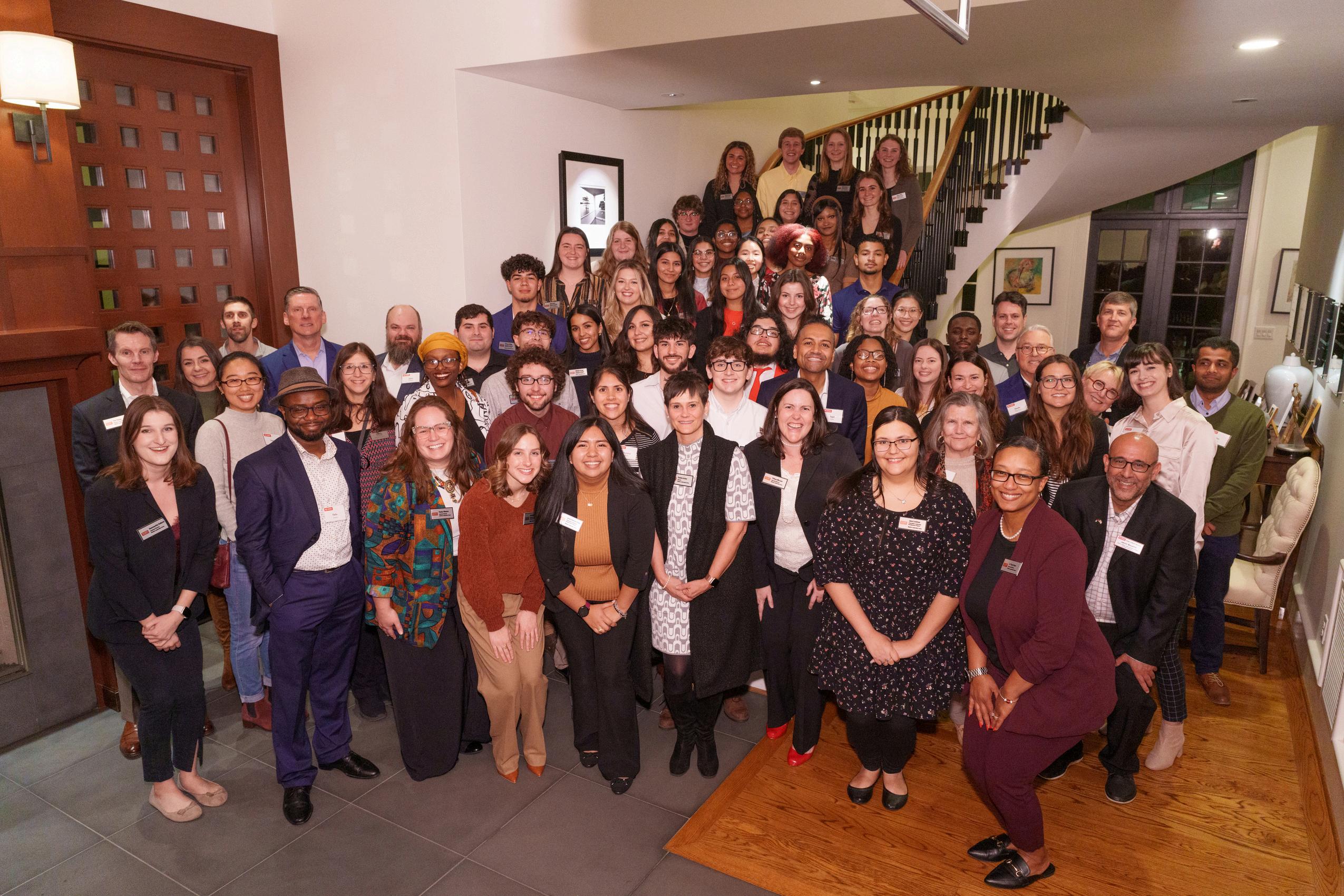
Every CLDP student is required to take and pass a one-credit hour course in the fall semester of year one. The Course is instructed by the CLDP Program Director.
SLC 102 is a one-credit course for students in the Chancellor’s Leadership Development Program (CLDP) offered through the Shelton Leadership Center (SLC). Within the context of the three-year program, this course serves as a foundation that provides a framework for student success. The purpose of this course is to encourage students to examine their responsibilities and commitments as student leaders through the principles of the SLC (integrity, diversity, social responsibility and compassion). Students will explore the Frost model of values-based leadership and Yosso’s Community Cultural Wealth Model, practice applying these concepts and skills in their own lives, and explore their own leadership through self-assessments, reflection, and practice. The application of course content will be through other CLDP experiences, such as faculty/staff mentoring groups, service projects, and other programs within the three-year experience.
In exchange for the benefits outlined in Section 1, the Participant agrees to the following obligations:
Maintain open availability on Tuesday evenings from 6:00 pm - 8:00 pm for scheduled CLDP Meetings.
Students are expected to attend all monthly leadership development seminars (Tuesday's at 6pm)
Complete any assigned projects: First year students will create a Leadership Portfolio which will be developed over the course of the year and must be submitted in May to be eligible to return for Year 2.
Individual Coaching/Mentoring: Attend one-on-one monthly coaching sessions with a CLDP staff member and monthly Peer mentoring with a CLDP student (may be conducted in person or virtually)
Chancellor's Events: Attend at least once per semester.
Social and Service Programs: Participate in at least 2 programs each semester.
Students are expected to adhere to all University policies, as outlined in the NCSU Code of Student Conduct.
Professionalism: Maintain appropriate and professional conduct, both in and outside CLDP.
Attire: Students should wear appropriate clothing and shoes. Students are encouraged to have at least one professional outfit for special occasions such as Networking events and Chancellors dinners.
For examples visit: https://www.indeed.com/career-advice/starting-new-job/guideto-business-attire
The NCSU Wolfpack Styled Professional Clothing Closet is operated by the Career Development Center and provides donated professional clothing at no cost to NCSU Students.
Bullying, harassment, and/or assault of another student, facilitator, faculty or staff, as defined in the NCSU Code of Student Conduct, will be cause for immediate dismissal from the Program.
Disciplinary probation by NC State's Office of Student Conduct will prohibit participation in CLDP activities.
Enroll in and successfully pass SLC 102 ( 1hr for-credit leadership development course)
Maintain a minimum 2.5 Cumulative GPA at NC State
Grades will be reviewed by the Director at the end of each semester. Students below a 2.5 GPA will be given a warning. Students will have 1 semester to meet GPA requirements.
Academic Probation:
Warning/Probation: Below semester GPA requirements
Probation Period: Students will have 1 semester to meet GPA requirements
Withdrawal: below GPA requirements after 2 semesters
1st Offense (i.e., missed seminar or mentor meeting) = 1st warning notice
2nd Offense (i.e., missed seminar or mentor meeting) = 2nd warning notice, probation notice
3rd Offense (i.e., missed seminar or mentor meeting) = Program dismissal
CLDP is designed as a 2 year program with an optional 3rd year component. The offense levels are cumulative for the duration of a student's participation in CLDP. They do not start over each academic year. Additionally, not meeting CLDP expectations may affect participant eligibility for CLDP benefits and incentives to include trips and scholarships.
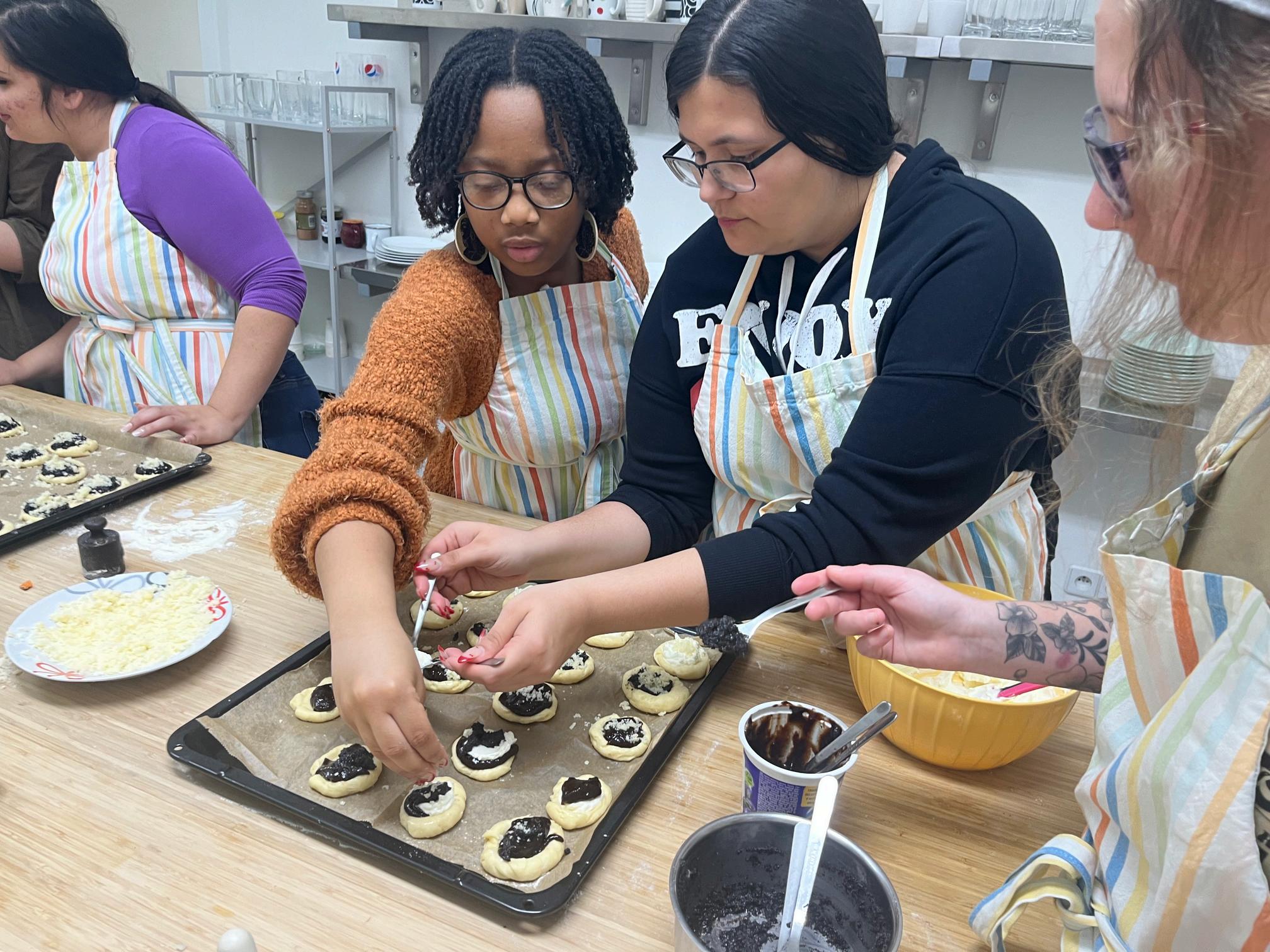
The CLDP cohort-based curriculum is informed by Frost's Values-Based Leadership Model (FVBL) and NACE Career Ready Workplace Competencies, to provide participants with the necessary skills needed to enter the professional workforce as values-based leaders.
Frost's Values-based leadership Model, in alignment with Shelton Center values, emphasizes the importance of personal values in guiding leadership actions. It consists of three dimensions, used in designing the cohort-based CDLP curriculum model: Leading Self, Leading Other, and Leading the Organization.
NACE Career Ready Workplace Competencies, which addresses career and selfdevelopment, communication, critical thinking, equity and inclusion, leadership, professionalism, teamwork and technology skills, serves as a supplemental source in the development of program workshops and seminars. (Source: https://www.naceweb.org/career-readiness)
The CLDP learning goals are informed by Frost’s (2011) model of value-based leadership. Throughout the program, students engage in intentional experiential learning activities to support their growth and development in the following domains:
Leading Self (Year 1): Students will articulate their personal values and goals, creating a personal development plan for continuous growth.
Leading Others (Year 2): Students will facilitate collaborative processes to establish shared team values and goals, empowering team members to make autonomous decisions aligned with those values and service to others.
Leading Organizations (Year 3): Students will analyze organizational practices, identifying opportunities to align them with shared values and proposing strategies to achieve common goals.
The Chancellor's Leadership Development Program's Fall Retreat is a pivotal event for incoming students. This retreat, held annually at the start of the fall semester, provides a unique platform for new students to forge strong bonds with their cohort while also connecting with returning CLDP students and staff. Through a series of thoughtfully designed activities and interactions, the retreat fosters a sense of community and belonging, setting the stage for a successful and enriching experience within the program. The new student retreat is mandatory for all incoming CLDP students. Failure to attend the retreat may affect CLDP participation and scholarship eligibility.
Throughout the program, students engage in intentional experiential learning activities to support growth and development. Workshops are mandatory and take place on Tuesday evenings from 6:00pm-8:00pm. A calendar of events is provided each fall to allow for advance planning. Workshops are in addition to the social and service attendance requirements.
All CLDP Students are required to attend a minimum (1) Social and (1) Service events each semester.
Y3 Students are tasked with planning and facilitating a minimum of 6 CLDP social and service events each year.
3 social events focused on team building and relationship building between CLDP cohorts.
3 community service projects that address various needs within the NCSU and local communities.
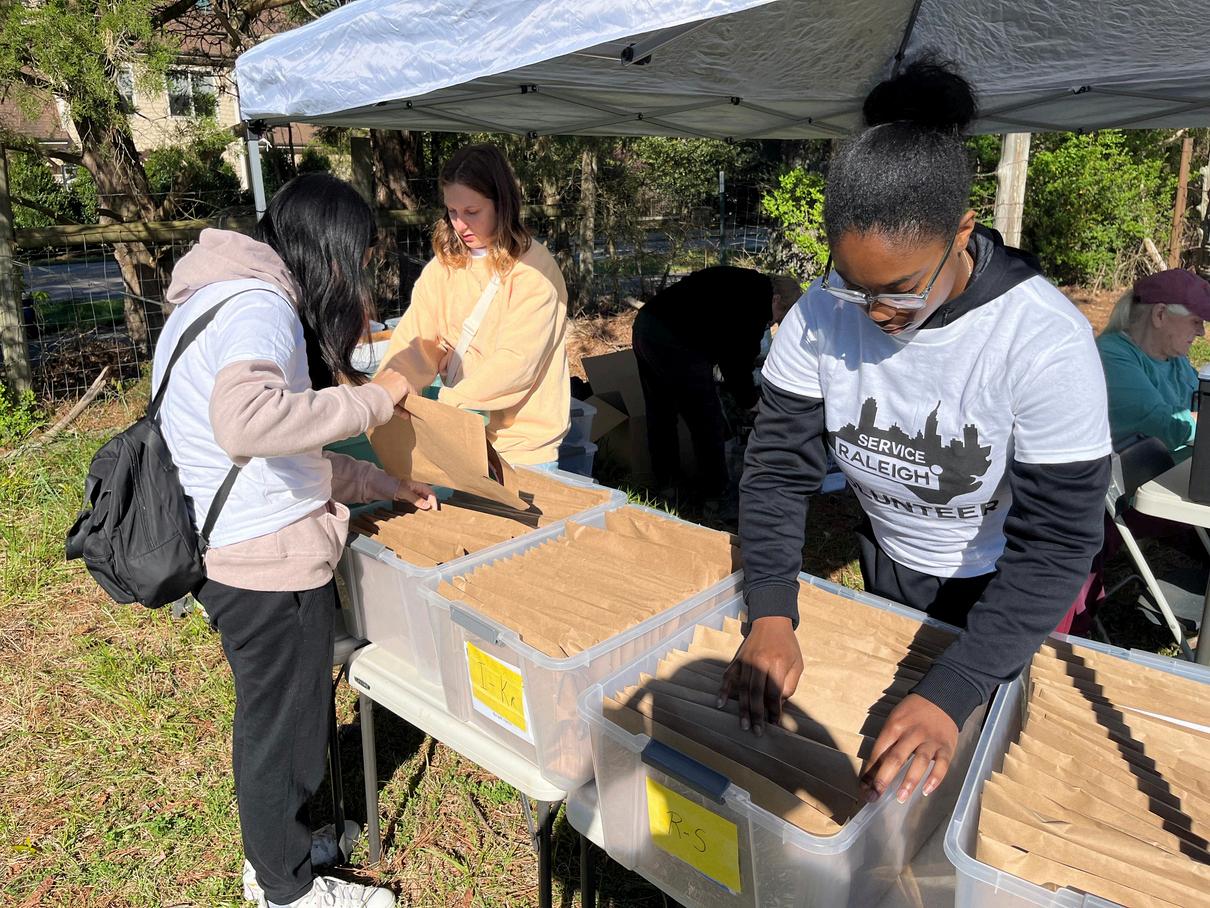

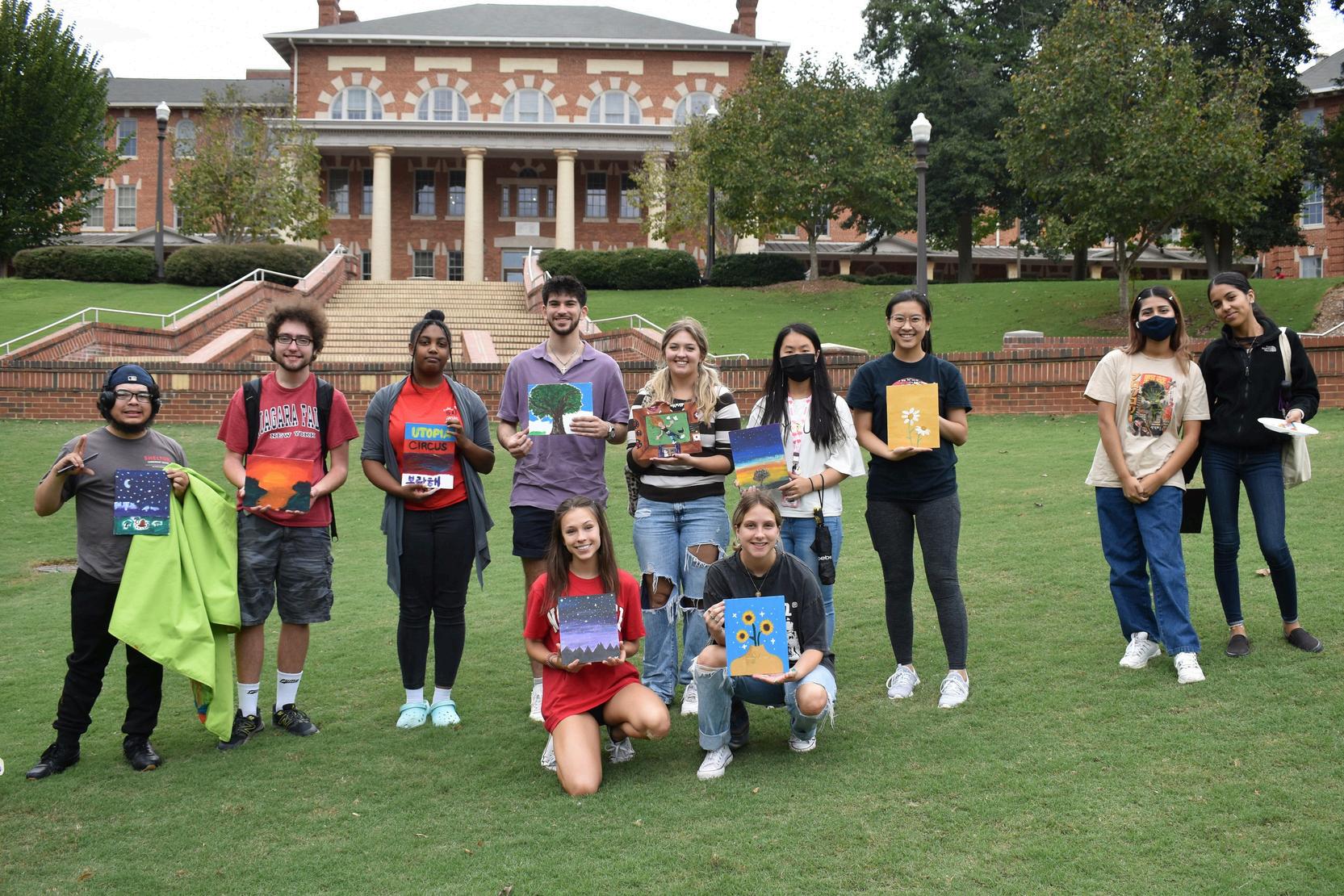
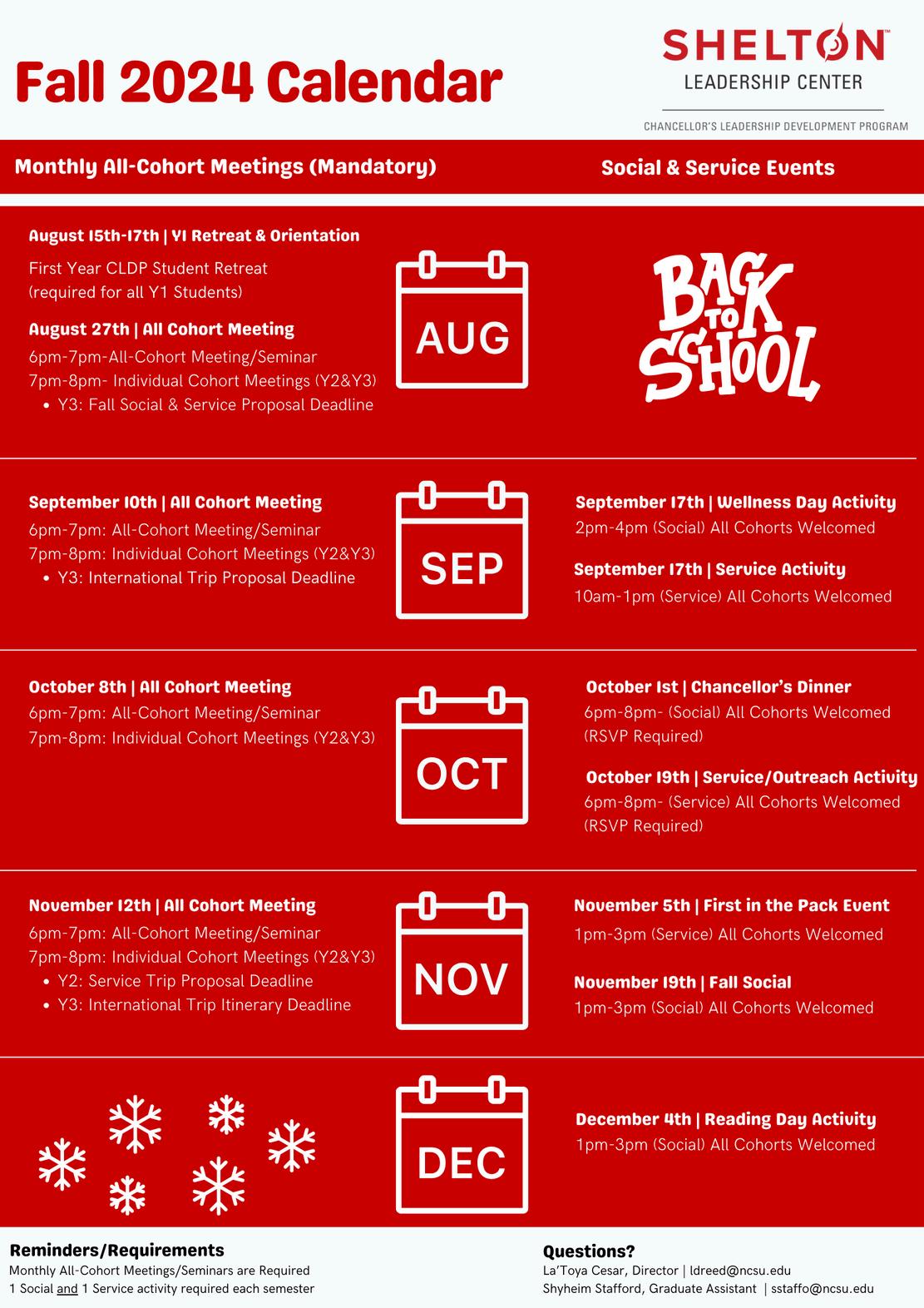
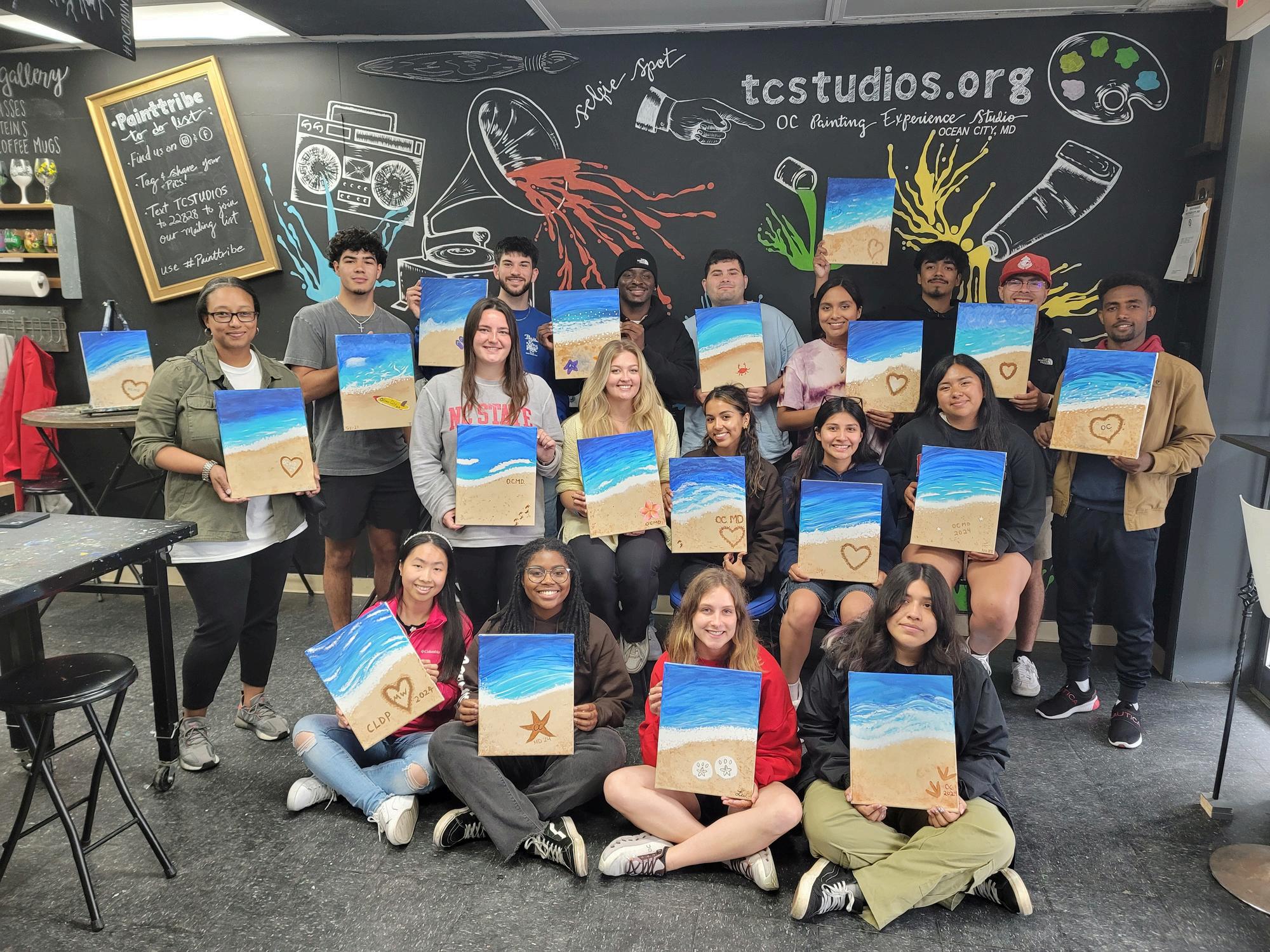
The Shelton Center and CLDP is rooted heavily in the philosophy of Social Responsibility. By embracing service to others, the CLDP cultivates a new generation of Servant Leaders who are not only equipped to succeed personally and professionally, but who are also dedicated to serving their communities and making a positive impact on the world.
Servant leadership is infused within the CLDP framework through various initiatives including:
Community Service Projects: CDLP Participants participate in 2 community service activities (1 in fall and 1 in spring) each year while enrolled in the program. Service projects are planned and coordinated by Y3 participants and may include the University and local communities. Through various service projects, participants have an opportunity to explore the benefits of selfless acts of service while demonstrating their own values and commitment to social responsibility, trust building, inspiring and creating positive change in their communities and organizations.
Domestic Service Trip: Y2 CLDP students will plan and facilitate a week-long end-of-year domestic service project addressing a community need/disparity (e.g., homelessness, food insecurity, environmental conservation). This experience will foster collaboration, trustbuilding, and appreciation for diversity as students work together to address real-world challenges. Students will enhance their communication skills through project planning and execution, and gain practical experience in conflict resolution and delegation. This immersive experience will also provide opportunities for students to develop empathy and compassion as they work alongside community members, promoting social responsibility and contributing to the well-being of others.
Community Outreach: Y2 CLDP Students will plan and facilitate at least 2 community outreach initiatives each year that give back to youth from first-generation and/or rural NC communities, fostering a strong sense of social responsibility and empathy/compassion towards these communities. Outreach initiatives may include mentorship, tutoring, and/or other activities designed to inspire, educate, and develop values-based leaders. Outreach aligns with the SLC mission of selfless service and broadening the center's impact and reach across North Carolina.
Mentoring plays a crucial role in the CLDP program, fostering growth and development of first generation and rural NC Students. CLDP Offers 3 levels of mentoring to CLDP Students:
Peer-to-Peer Mentoring: 2nd and 3rd year students are matched with first year students to create a sense of community, mutual support, and shared accountability. Peer mentoring encourages a collaborative learning environment where participants can share experiences, challenges, and successes with colleagues at a similar level.
Staff Mentoring: SLC Staff are matched with CLDP students to provide participants with guidance and support. This helps participants navigate the complexities of the college experience and develop the skills necessary to succeed.
Professional Mentoring: 2nd and 3rd year students are matched with professionals in their prospective majors and/or careers of interest. Professional mentoring expands a student's professional network who can offer insights, perspectives, and advice on navigating college, applying to graduate school, and successfully entering into the workforce.
CLDP offers opportunities for various networking and relationship building experiences.
Social Networking & Team Building: CLDP Participants will engage in two social networking events each year, one in fall and one in spring, while enrolled in the program. These CLDP-exclusive social events, planned and coordinated by Year 3 participants, aim to foster trust-building and collaboration among program participants through activities such as Friendsgiving, game nights, and end-of-year celebrations. These events provide a platform for students to practice effective communication and appreciation for diversity in a relaxed and inclusive setting.
Professional Networking: CLDP-exclusive networking events, such as dinners with the Chancellor and other executive leadership, donors, and corporate leaders, offer students invaluable opportunities to refine their networking skills and business etiquette. By interacting with influential figures in a safe and supportive learning environment, students can apply the knowledge and skills acquired in CLDP workshops and seminars, bridging the gap between theory and practice. These events also encourage students to develop cultural competence and accountability to others as they navigate professional interactions.
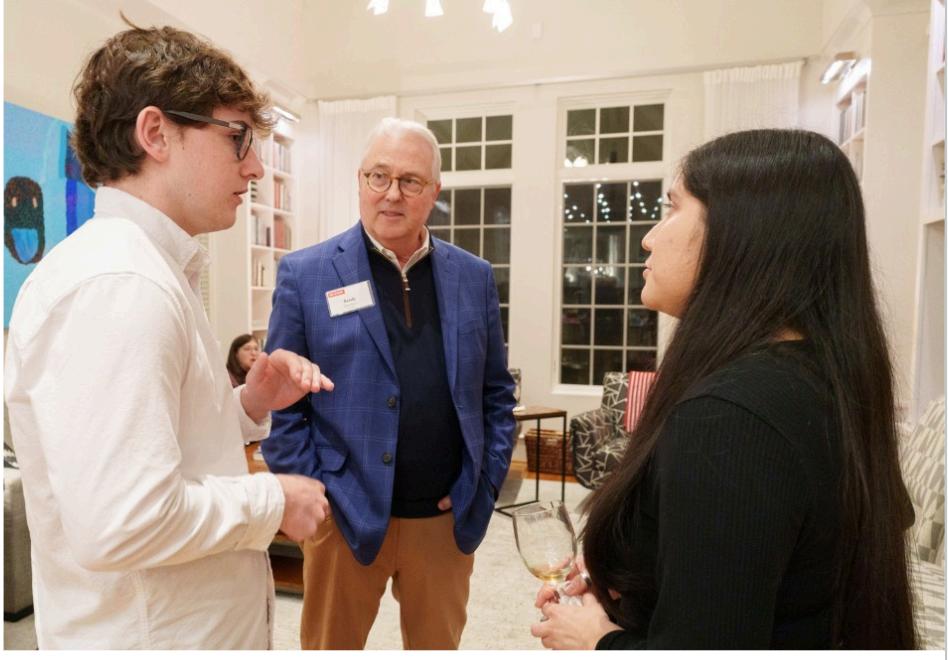
Y2 CLDP students will plan and facilitate a week-long end of year domestic service project, which will address an area of need/disparity (i.e homelessness, food insecurity, environmental conservation, etc) within a community of choice. Learning outcomes of this experience include enhancing communication and collaboration skills, providing realworld opportunities to practice conflict resolution, building trust and teamwork through shared experiences, and improving delegation skills.
Expectations:
Proposals outlining the goals, themes, location and budget for the trip must be submitted to the Director in the Fall prior to the trip. Proposal approval is at the discretion of the Program Director
Address a community need (i.e homelessness, food insecurity, environmental conservation, etc) within the Continental United States. Must include a minimum of 3 hours of service for each day (i.e 5 day trip=15 hrs of service)
All Cohort members are expected to contribute and assist in the planning and execution of the trip.
Planning and execution of the trip should include the following:
Researching the chosen location(s), cultural nuances, foods, language and history
Develop a detailed itinerary, secure quotes for travel, accommodations, meals, and group excursions.
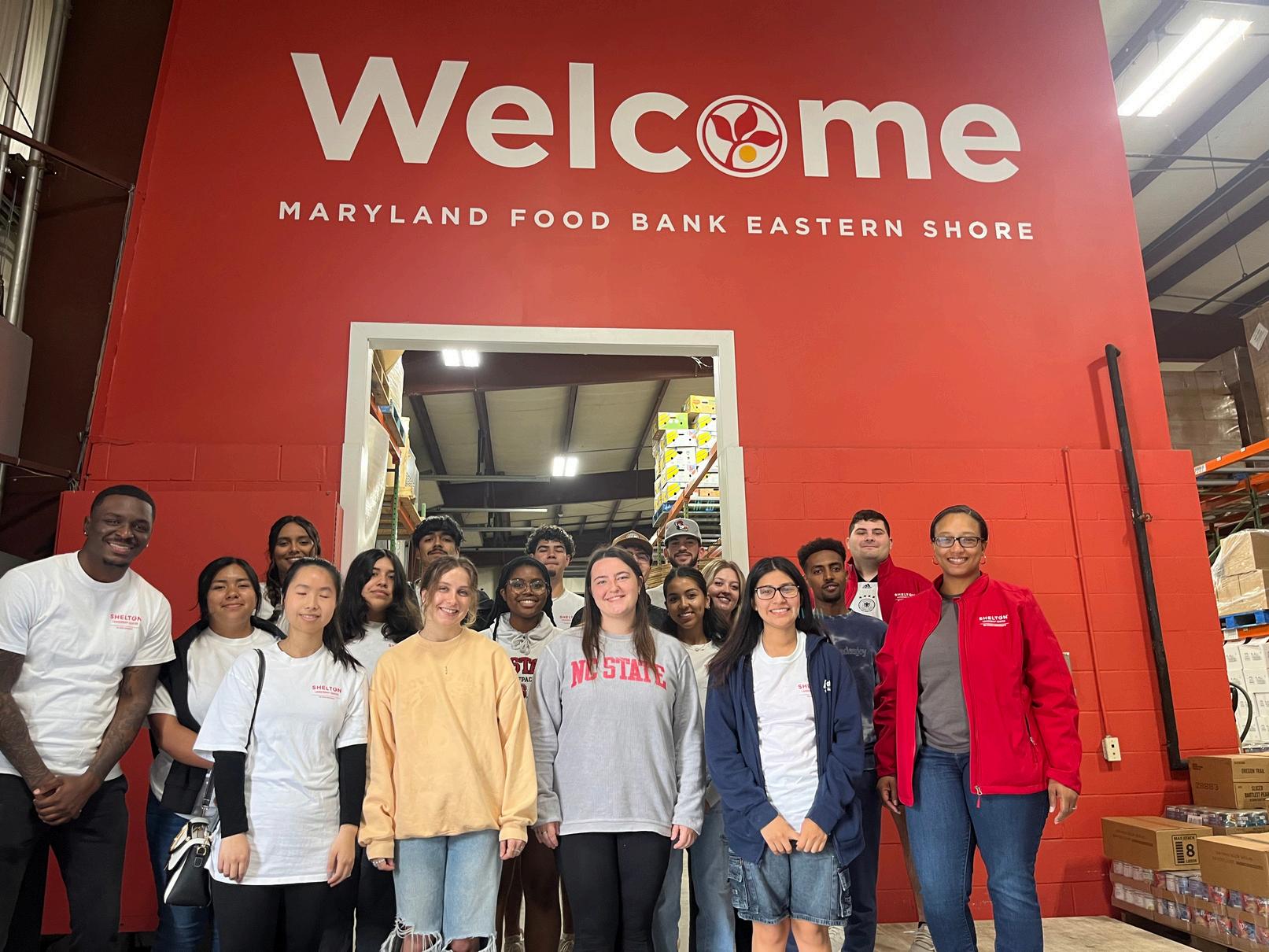
Year 3 students will plan and facilitate a week-long global leadership experience each spring, designed to enhance their cross-cultural competence and appreciation for diversity. The experience includes exposure to international businesses, educational and legal systems, and cultural exploration, providing opportunities to develop critical thinking, effective communication, collaboration, leadership, and professionalism – key NACE Career Readiness Workplace Competencies. Through interaction with diverse cultures, students will gain a deeper understanding of cultural nuances and foster a global perspective essential for success in today's interconnected world.
Expectations:
Proposals defining the trip's purpose, goals, and target destinations, forming a planning team, and establishing a timeline and budget for the GLE must be submitted to the Director in the Fall prior to the trip. Proposal approval is at the discretion of the Program Director
All Cohort members are expected to contribute and assist in the planning and execution of the trip.
Planning and execution of the GLE Experience should include the following: Researching the chosen location(s), cultural nuances, foods, language and history
Developing a detailed itinerary, including securing quotes for travel, accommodations, visas/passports, meals, and group excursions. incorporating leadership focused cultural experiences, planning service-learning projects, and/or securing tours or guest speakers.
Obtaining approvals, creating promotional materials, hosting information sessions, collecting participant information, and conducting pre-departure orientations.
Reflection and evaluation should be imbedded within the GLE to evaluate program effectiveness and learning objectives
Important Deadlines:
Draft Proposal Deadline: September
Final Proposal Deadline: November
Eligibility Requirements:
Must be actively involved as 3rd Year CLDP Participant in good standing (not on CLDP or NCSU probationary status).
CLDP 3rd year participants completing coursework in the Winter prior to the GLE must be actively enrolled NCSU Students to attend. Graduates who are no longer enrolled at NC State are ineligible.
Actively participate in all pre-planning committee meetings and Y3 responsibilities.


